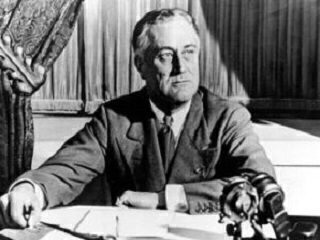On November 5, 1940, President Franklin D. Roosevelt won a third term in office—an unprecedented act that would be barred by a constitutional amendment a decade later.
Roosevelt’s decision to break the precedent set by George Washington was made in July 1940, as the United States neared its entry into World War II.
The third-term decision dominated his election campaign against the Republican contender, Wendell Wilkie. In the end, Roosevelt won the election by a wide margin, and he was able to win a fourth election in 1944.
But the popular fallout about the concept of a long-term president led to the ratification of the 22nd amendment in 1951.
“No person shall be elected to the office of the President more than twice, and no person who has held the office of President, or acted as President, for more than two years of a term to which some other person was elected President shall be elected to the office of the President more than once,” the amendment read, in a clear reference to Roosevelt.
So why were people so upset with Roosevelt’s decision to seek a third term, and even more people opposed enough to approve a constitutional amendment?
Franklin Roosevelt wasn’t even the first Roosevelt to seek a third term in the White House. His distant cousin, Theodore Roosevelt, ran unsuccessfully as a third-party candidate in 1912, after declining to run in 1908. President Ulysses S. Grant also sought a third term in 1880, but he lacked enough party support to get a nomination.
The first president, Washington, set the two-term precedent in 1796 when he decided to pass on a third term, setting up a scramble between John Adams and Thomas Jefferson in the fall race.
In 1799, a friend urged Washington to come out of retirement to run for a third term. Washington made his thoughts quite clear, especially when it came to new phenomena of political parties.
“The line between Parties,” Washington said, had become “so clearly drawn” that politicians “regard neither truth nor decency; attacking every character, without respect to persons – Public or Private, – who happen to differ from themselves in Politics.”
Washington’s voluntary decision to decline a third term was also seen by many people as a safeguard against the type of tyrannical power yielded by the British crown during the Colonial era.
That message wasn’t lost on Theodore Roosevelt, who considered running in 1908 despite his public pledges to the contrary. Instead, he backed William Howard Taft as a surrogate candidate, but the urge to control his own political party drove Roosevelt back to the campaign trail in 1912.
In 1940, Franklin Roosevelt decided to break the Washington precedent after World War II broke out in Europe and Nazi Germany overran France. The move caused some key Roosevelt supporters within the Democratic Party to leave the Roosevelt campaign.
The Republicans campaigned heavily against a third-term president, and the Democrats countered with claims that Wilkie was a “third-rate” candidate.
Later in the campaign, Roosevelt insisted that he was in the race to keep America out of the war in Europe, and he easily defeated Wilkie on Election Day.
But talk about a presidential term-limits amendment started in 1944 when Republican candidate Thomas Dewey said a potential 16-year term for Roosevelt was a threat to democracy. In a speech in Buffalo on October 31, 1944, Dewey said, "four terms or sixteen years is the most dangerous threat to our freedom ever proposed. That is one reason why I believe that two terms must be established as the limit by constitutional amendment."
In March 1947, a Republican-controlled Congress approved the 22nd amendment, with an exception that would exclude a president in office from term limits during the ratification process. It took until February 1951 to get enough states to ratify the amendment, and President Harry Truman decided to opt against running for a third term. Since then, some members of Congress have introduced efforts to repeal the 22nd Amendment, but they haven’t made it out of committee.








